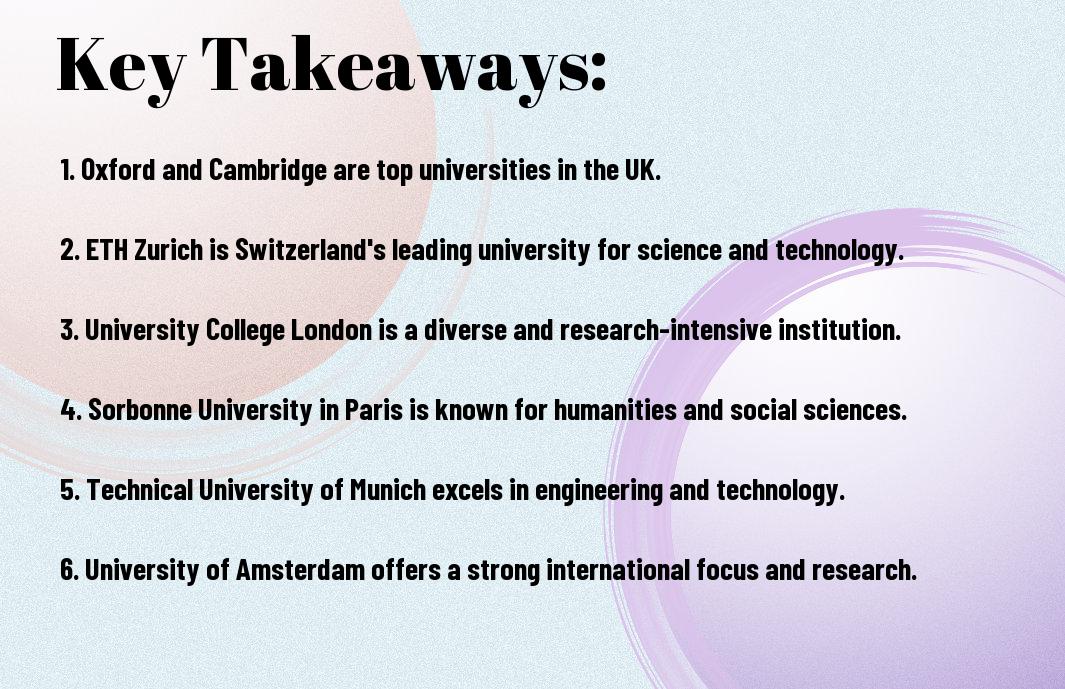With a rich history of academic excellence and groundbreaking research, Europe is home to some of the world’s top universities. In this blog post, readers will discover prestigious institutions like Oxford and Cambridge in the UK, ETH Zurich in Switzerland, and Sorbonne University in France. These universities not only offer top-notch education but also provide a vibrant and diverse learning environment for students from around the globe.

History of European Universities
The Oldest Universities in Europe
On a continent rich with history and tradition, European universities have played a pivotal role in shaping higher education around the world. Some of the oldest universities in Europe date back to the Middle Ages, with a legacy that continues to influence academia today. Universities such as the University of Bologna in Italy, founded in 1088, and the University of Oxford in the United Kingdom, founded in 1096, are among the oldest and most prestigious universities in the world.
Evolution of Higher Education in Europe
Any discussion of the history of European universities must acknowledge the evolution of higher education in the region. From the medieval universities focused on theology, law, medicine, and philosophy to the modern universities offering a wide range of disciplines and research opportunities, the landscape of higher education in Europe has undergone significant changes over the centuries. The establishment of universities across Europe has been instrumental in fostering intellectual growth and producing generations of scholars who have made profound contributions to various fields.
With increasing globalization and the exchange of ideas across borders, European universities continue to attract students and scholars from around the world. The diverse academic programs, world-class faculty, and vibrant campus life offered by European universities make them a top choice for those seeking a quality education in a rich cultural environment.
Top-Ranked Universities in Europe
Even in the competitive landscape of European higher education, a few universities stand out for their exceptional academic quality and research output. These institutions are not only prestigious but also attract top talent from around the world. Let’s probe into some of the top-ranked universities in Europe that have a long-standing reputation for excellence.
University of Oxford, UK
To many, the University of Oxford in the United Kingdom needs no introduction. Established in the 12th century, it is the oldest university in the English-speaking world. Oxford consistently ranks among the top universities globally, known for its rigorous academic programs and distinguished faculty members. With a strong emphasis on research across various disciplines, graduates from Oxford often go on to become leaders in their respective fields.
University of Cambridge, UK
Europe is home to another powerhouse in academia, the University of Cambridge, located in the United Kingdom. Founded in 1209, Cambridge is renowned for its contributions to science, literature, and innovation. The university fosters a culture of critical thinking and intellectual curiosity, attracting some of the brightest minds. With a rich history and a tradition of excellence, Cambridge continues to push boundaries and shape the future of education and research.
A renowned university in Sweden, ETH Zurich consistently ranks as one of the top universities in Europe and the world. Known for its cutting-edge research in science, engineering, and technology, ETH Zurich has produced multiple Nobel laureates and Turing Award winners. The university offers a vibrant academic community and state-of-the-art facilities, providing students with an unparalleled learning experience.
University of Geneva, Switzerland
On the serene shores of Lake Geneva, the University of Geneva in Switzerland stands as a beacon of academic excellence. With a strong focus on international collaboration and interdisciplinary research, the university attracts scholars and students from around the globe. Founded in 1559, the University of Geneva has a long history of intellectual pursuit and has made significant contributions to various fields, including diplomacy, physics, and social sciences.
In the heart of Bavaria, Germany, the University of Munich (Ludwig-Maximilians-Universität München) is a prestigious institution known for its academic prowess and research achievements. Established in 1472, the university has a strong emphasis on innovation and critical thinking, shaping the minds of future leaders across diverse disciplines. With a diverse student body and a network of renowned scholars, the University of Munich continues to uphold its reputation as a top-tier educational institution.
Academic Excellence
After exploring the latest QS World University Rankings: Europe 2024, it is clear that Europe is home to some of the most prestigious universities in the world. These institutions are renowned for their academic excellence, cutting-edge research, and interdisciplinary programs that prepare students for success in a rapidly changing global landscape.
Research Opportunities
With top-ranked universities in Europe, students have access to unparalleled research opportunities that span a wide range of disciplines. From medicine to engineering, social sciences to humanities, these institutions provide state-of-the-art facilities and resources to support groundbreaking research that addresses some of the world’s most pressing challenges. Students have the chance to work alongside world-renowned researchers and contribute to projects that have the potential to shape the future.
Interdisciplinary Programs
Excellence in academia often involves pushing boundaries and thinking outside traditional disciplinary constraints. European universities are leading the way in offering interdisciplinary programs that allow students to explore connections between different fields of study. These programs foster creativity, innovation, and collaboration, preparing students to tackle complex problems from multiple perspectives.
Another key aspect of interdisciplinary programs is the emphasis on real-world applications. By combining knowledge from various disciplines, students are equipped with the tools to address multifaceted issues and develop holistic solutions. This approach not only enriches the academic experience but also enhances students’ problem-solving skills and critical thinking abilities.
International Collaborations
Collaborations with international institutions and organizations play a crucial role in advancing academic excellence and fostering global cooperation. Top-ranked universities in Europe actively engage in partnerships with counterparts around the world, enabling students and faculty to exchange ideas, research findings, and best practices. These collaborations enrich the academic environment, expose students to diverse perspectives, and open up opportunities for cross-cultural learning and collaboration.
To further enhance their academic offerings and research capabilities, European universities prioritize building strong relationships with institutions in other countries. This not only benefits the institutions involved but also creates a network of academic excellence that transcends borders and drives innovation on a global scale.


Student Life in Europe
Many students who choose to study in Europe are drawn to the rich cultural immersion that the continent offers.
Cultural Immersion
One of the most appealing aspects of studying in Europe is the opportunity for cultural immersion. With its diverse history, languages, and traditions, students have the chance to explore different cultures and broaden their global perspective. Whether it’s attending local festivals, trying traditional cuisine, or visiting historical landmarks, students can truly immerse themselves in the vibrant tapestry of European culture.
Language Diversity
Europe is known for its linguistic diversity, with each country having its own unique language. However, English is widely spoken in many European countries, making it easier for international students to communicate and navigate daily life. Students who study in Europe have the chance to learn a new language or improve their language skills, which can be beneficial for their future careers in an increasingly globalized world.
Europe’s language diversity offers a unique opportunity for students to engage with different cultures and languages, fostering a deeper understanding and appreciation for the world around them.
Campus Life and Extracurricular Activities
To enhance their academic experience, students in Europe can engage in various extracurricular activities and enjoy vibrant campus life. From clubs and sports teams to cultural events and volunteer opportunities, there are numerous ways for students to connect with their peers and make lasting memories.
Diversity is at the heart of campus life, with students from various backgrounds coming together to share their experiences and learn from one another. This inclusive environment promotes cross-cultural understanding and collaboration, enriching the overall student experience.
Immersion in campus life and participation in extracurricular activities can help students develop valuable skills such as teamwork, leadership, and communication, preparing them for success in their future endeavors.
Career Opportunities
Job Market in Europe
Once again, Europe offers a diverse and dynamic job market for graduates of its top-ranked universities. With a strong emphasis on education and innovation, graduates are well-equipped to enter various industries and make a significant impact. From leading multinational companies to cutting-edge startups, the job market in Europe is ripe with opportunities for those who have honed their skills at prestigious institutions.
Networking Opportunities
One key benefit of attending a top-ranked university in Europe is the vast networking opportunities available. Whether through alumni networks, industry events, or career fairs, students have the chance to connect with professionals from a wide range of fields. These connections can open doors to internships, job opportunities, and valuable mentorships that can help propel their careers forward.
Europe’s vibrant and interconnected business community provides a fertile ground for students to expand their professional network and explore different career paths. By engaging with peers, professors, and industry leaders, students can gain valuable insights and build relationships that can last a lifetime.
Entrepreneurial Spirit
The entrepreneurial spirit thrives in Europe, with many top-ranked universities fostering a culture of innovation and creativity. Students are encouraged to think outside the box, take risks, and pursue their entrepreneurial dreams. Whether launching a tech startup, social enterprise, or creative venture, graduates are well-supported in turning their ideas into reality.
The emphasis on entrepreneurship at these universities not only equips students with the skills and knowledge to start their own businesses but also instills a sense of confidence and ambition that is indispensable in today’s competitive job market.
Admissions and Scholarships
Application Process
Now, one key aspect to consider when applying to these top-ranked universities in Europe is the application process. Each university may have different requirements, so it is vital for prospective students to carefully review the admission guidelines on the university’s official website. Generally, candidates will need to submit their academic transcripts, letters of recommendation, a personal statement, and in some cases, standardized test scores like the SAT or ACT.
Scholarship Opportunities
To access scholarship opportunities, prospective students should explore the various funding options available at these top-ranked universities in Europe. Scholarships can be based on merit, financial need, specific areas of study, or even extracurricular achievements. It’s crucial to research and apply for scholarships early, as some may have deadlines that coincide with the university application deadline. Additionally, reaching out to the university’s financial aid office for guidance on available scholarships can be beneficial.
Scholarships can significantly reduce the financial burden of studying at a top-ranked university in Europe and make the academic journey more accessible to a broader range of students. By securing scholarships, students can focus more on their studies and extracurricular activities, enhancing their overall university experience.
Financial Aid and Grants
Scholarship opportunities are just one aspect of the financial aid landscape at these top-ranked universities in Europe. Financial aid offices at these institutions also offer grants and other forms of financial assistance to help students finance their education. These grants may be based on financial need, academic achievement, research interests, or a combination of factors. It is vital for students to explore all avenues of financial aid to make their educational dreams a reality.
It is recommended that prospective students schedule a meeting with a financial aid advisor at the university to discuss their individual financial situation and explore all possible options for funding their education. By taking advantage of the financial aid resources available, students can focus on their academic pursuits and maximize their university experience.
Summing up
On the whole, Europe is home to a diverse range of top-ranked universities that offer world-class education across various disciplines. Whether one is interested in science, technology, humanities, or business, there are prestigious institutions like ETH Zurich, University of Oxford, and Sorbonne University that consistently rank among the best in the world. With their rich history, cutting-edge research facilities, and innovative teaching methods, these universities continue to attract students from around the globe seeking to further their academic pursuits.





















Discussion about this post